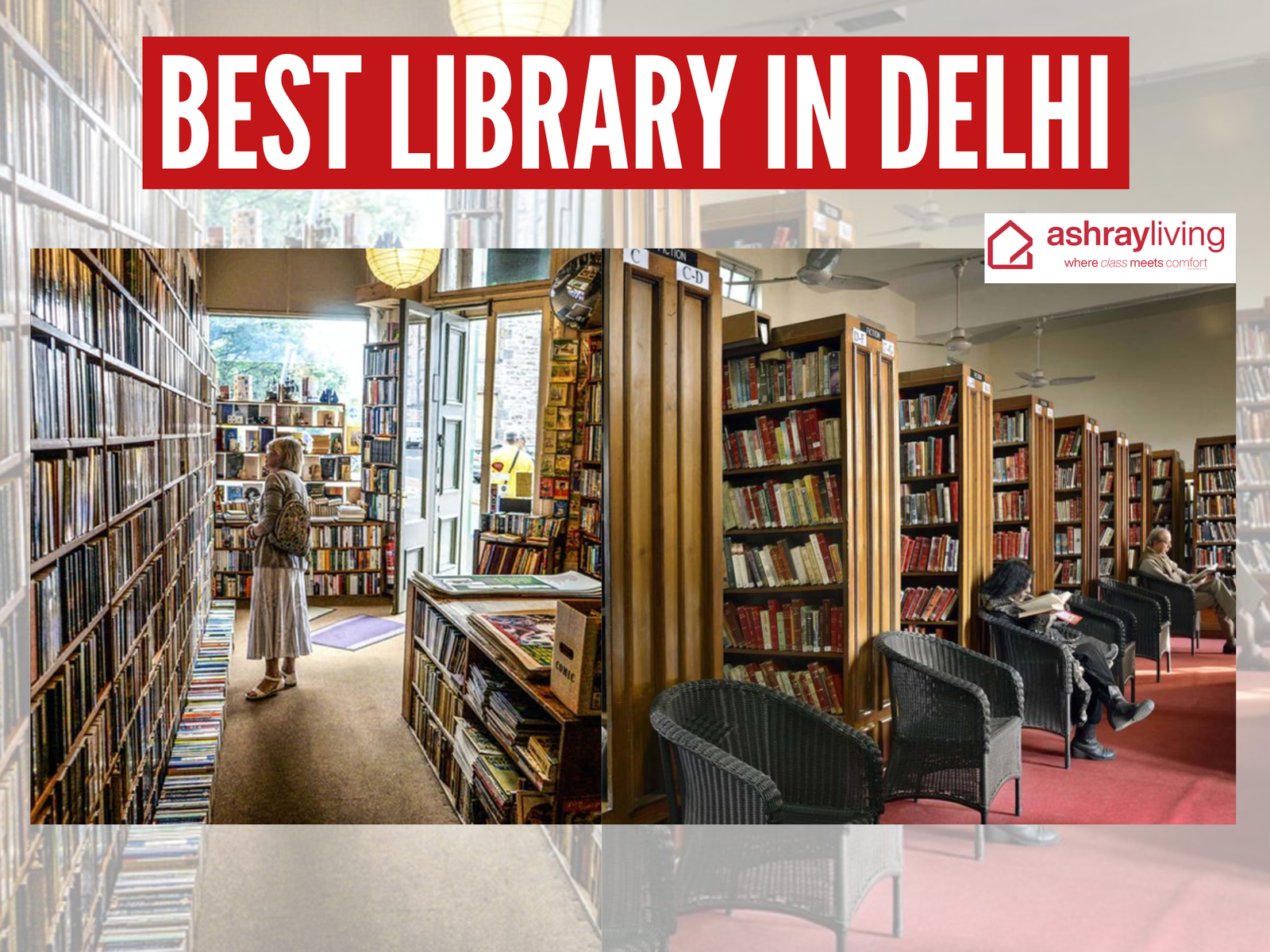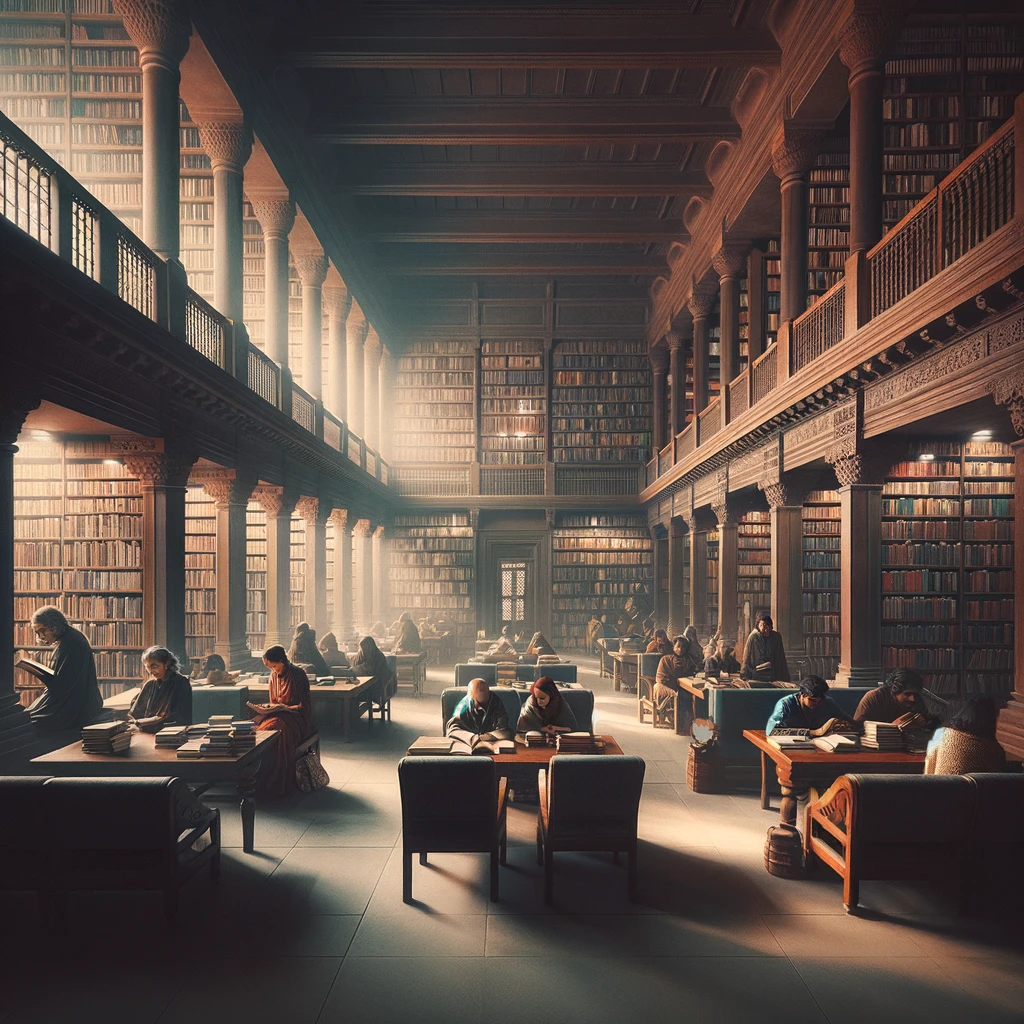
Libraries are the backbone of our education system” – Karin Slaughter
In Indian culture, libraries play a crucial dual role in both education and culture, serving as repositories of knowledge and guardians of cultural heritage. Libraries have always been more than just buildings housing books; they are dynamic spaces where individuals can explore, learn, and connect with the world around them. In the context of education, libraries provide essential resources and support for students and working professionals at all levels, offering access to textbooks, research materials, and digital resources that complement classroom learning. Additionally, libraries serve as cultural hubs, preserving and promoting diverse forms of artistic expression, literature, and historical records. Through their collections and programming, libraries foster a deeper understanding of different cultures and promote cross-cultural dialogue and appreciation.
Thus, libraries in Delhi and beyond are instrumental in shaping both the educational landscape and cultural identity of communities, enriching lives and inspiring lifelong learning.
Delhi is a hub of historical and modern libraries
Delhi's historical and modern libraries reflect the city's commitment to enlightenment and cultural preservation. From the ancient Red Fort to the modern Jawaharlal Nehru University Central Library, they serve as hubs of learning, hosting events celebrating Delhi's heritage. Amidst the bustling urban landscape, they offer resources and amenities to visitors seeking knowledge. In these citadels of learning, literary festivals, art exhibitions, and scholarly symposiums converge, weaving a tapestry of intellectual discourse that honours Delhi's past and shapes its future.
Best Libraries in Delhi

In Delhi's vibrant intellectual landscape, libraries like the Delhi Public Library, Jawaharlal Nehru University Central Library, and British Council Library shine as bastions of knowledge and culture. Each offers a unique experience, from historical grandeur to academic excellence and literary indulgence. These libraries beckon seekers on transformative journeys of enlightenment and discovery, embodying Delhi's rich intellectual heritage. So, without further ado, let’s dive into the famous libraries of Delhi.
-
Delhi Public Library

Established in 1951 with UNESCO's aid and inaugurated by Prime Minister Pt. Jawaharlal Nehru, Delhi Public Library is Southeast Asia's busiest. It includes a Central Library, 3 Branch Libraries, and 24 Sub-Branch Libraries. Services like Braille and mobile libraries cater to diverse needs. With over 18 lakh books in multiple languages and 9,431 gramophone records, the library operates seven days a week, except for National Holidays.
Key features and collections
-
Free Internet Service:
-
Available at Central Library and 11 branches.
-
Complimentary for members.
-
Free CD/DVD Services:
-
Borrow movies and educational content.
-
Offered at Central Library and four branches.
-
Children's Section:
-
New books, CDs/DVDs, computers, and games available.
-
Mobile Library Services:
-
Four vans serving 73 areas.
-
Benefit 4,275 registered members.
-
Braille Library Services:
-
Specialised services with 15,699 items.
-
Serves 20 institutions via Braille Mobile Library Services.
-
National Archives of India
Established in 1891, the National Archives of India preserves the nation's historical records, serving as the repository of official documents of the Government of India. It offers a panoramic view of India's evolution, making it indispensable for scholars, researchers, and policymakers.
Highlight of unique archives and resources
-
Diverse Collections: Preserves historical materials from various periods.
-
Ancient Manuscripts: Includes documents dating back to ancient times, like royal decrees.
-
Colonial-Era Records: Contains documents from British rule, offering insights into colonial history.
-
Post-Independence Materials: Provides records from India's sovereign journey.
-
Unique Treasures: Includes Mughal Emperors' Firmans, rare manuscripts, maps, and photographs.
-
Specialized Collections: Focuses on themes like the freedom struggle and regional histories.
-
Digitization Initiatives: Aims to enhance accessibility through digitization.
3. Nehru Memorial Museum and Library
Established in 1966, the Nehru Memorial Museum and Library (NMML) honours Jawaharlal Nehru's legacy, housing archival treasures and cultural artefacts. Its library serves as a beacon of enlightenment for scholars exploring India's socio-political evolution. Within its corridors, Nehru's ideals echo, fostering intellectual inquiry amidst NMML's vast expanse.
Focus on its specialised collections
-
Specialized Collections: NMML offers diverse materials on India's modern history.
-
Archives Materials: Includes personal papers, official documents, and rare publications on Nehru and the Indian National Congress.
-
Extensive Topics: Covers independence struggle, democratic evolution, foreign policy, and socio-economic development.
-
Notable Treasures: Nehru's speeches, letters, manuscripts, and works by eminent historians.
-
Scholarship Hub: NMML's library fosters research, shaping India's modern history and identity.
4. Indira Gandhi National Centre for the Arts Library
The library at Indira Gandhi National Centre for the Arts (IGNCA), established in 1987, promotes interdisciplinary research and preservation of India's cultural heritage. It fosters cross-cultural dialogue and celebrates India's artistic traditions through extensive collections, advancing cultural appreciation globally.
Details on its unique collections
-
Diverse Collections: IGNCA's library offers materials across artistic disciplines.
-
Rich Archives: Includes rare manuscripts, folk music, dance performances, and more.
-
Indian Arts Focus: Unique collections highlight classical music, dance, and visual arts.
-
Scholarly References: Essential resources for scholars, artists, and enthusiasts, offering insights into India's cultural landscape.
-
American Center Library
The American Center Library offers a diverse collection of modern resources, including bestsellers and classic works across genres. Patrons access online databases, e-books, audiobooks, and multimedia resources. Whether exploring Mark Twain or the latest literary trends, visitors can immerse themselves in literary richness.
Information on cultural and educational events
-
Vibrant Events: American Center Library hosts cultural and educational events.
-
Author Talks: Engage with authors and enjoy book signings.
-
Film Screenings: Showcase films and art exhibitions.
-
Cultural Programs: Highlight American literature, music, film, and contemporary issues.
-
Educational Workshops: Offer learning opportunities on various topics.
-
Cross-Cultural Understanding: Promote dialogue and enrich cultural landscape.
6. British Council Library
The British Council Library offers a broad collection of British literature and educational resources across genres and eras, including Shakespeare and contemporary bestsellers. It provides access to textbooks, reference materials, and language learning resources, fostering intellectual enrichment and cultural exchange.
Mention its digital and cultural programs
-
Digital Resources: Access e-books, online courses, and digital learning platforms.
-
Virtual Events: Attend online book clubs, author webinars, and virtual art exhibitions.
-
Language Learning: Utilise language learning apps and online resources.
-
Webinars and Workshops: Participate in virtual events covering literature, arts, education, and career development.
-
Digital Archives: Explore past cultural events and exhibitions through digital archives.
-
Sahitya Akademi Library
The Sahitya Akademi Library, a cornerstone of Indian literary heritage, preserves and celebrates diverse Indian literature and languages. With a vast collection, including rare books and manuscripts, it serves scholars and literature enthusiasts, shaping the landscape of Indian literature.
Key features include rare books and manuscripts
-
Rare Collection: Sahitya Akademi Library houses invaluable rare books and manuscripts.
-
Insightful Materials: These offer unique insights into India's literary tradition and cultural heritage.
-
Scholarly Benefit: Scholars benefit from access to these materials for in-depth study.
-
Cultural Preservation: The collection contributes to preserving and promoting India's literary heritage.
7. Hardayal Municipal Public Library
Located in Chandni Chowk, the Hardayal Municipal Public Library is Delhi's oldest, established in 1862 as the Delhi Public Library before being renamed to honour Lala Hardayal. It boasts a collection of over 170,000 books in languages such as Hindi, English, Urdu, Arabic, Persian, and Sanskrit. Noteworthy are its 8,000 rare books, some dating back to the 17th century. Governed by a Managing Committee, it remains a cultural and educational hub in Delhi.
Highlight its rare collections and archives
-
Library Collection:
-
Over 170,000 books in Hindi, English, Urdu, Arabic, Persian, and Sanskrit.
-
Houses at least 8,000 rare books, a notable feature among global libraries.
-
Historical Books:
-
The oldest book in the library is block-printed, highlighting its historical significance.
-
Archives and Gazettes:
-
3,123 Gazettes of India & Delhi Gazettes accessible, covering government notifications from 1917 to 1998.
-
Newspapers:
-
Receives newspapers including Times of India, The Hindustan Times, Nav Bharat Times (Hindi), Hindustan (Hindi), and Jansatta.
-
Antique Decor:
-
Antique decor with ancient bookshelves and almirahs, contributing to its historical ambience.
-
Jawaharlal Nehru University (JNU) Central Library
The JNU Library holds 5 lakh books and 50k volumes. It subscribes to 1k journals, offers physical and virtual study materials, and maintains exchange relations with global agencies. Connected to Delhi Library Network and INFLIBNET, it has 48 terminals and subscribes to online journals via ACM and IEEE consortia.
Focus on its research facilities and diverse collections
-
Library Size and Infrastructure:
-
Ground floor: Approx. 50,000 sq. ft.
-
Nine-story building: Each floor spans around 6,000 sq. ft.
-
Collection Statistics:
-
Books: Over 5 lakh
-
Volumes: More than 50,000
-
Annual Addition: Average of 10,000 books
-
Journals and Serials:
-
Subscribed Journals: Around 1,000
-
Serials: Approximately 1,000
-
Digital Resources:
-
Online Access: Subscriptions to electronic journals and databases
-
Indian Law Institute Library
Overview of its specialised focus on law and legal studies and Information on its comprehensive legal databases and resources
Specialized Focus on Law and Legal Studies:
-
The Indian Law Institute Library is renowned for its dedicated emphasis on law and legal studies.
-
It serves as a vital resource centre for students, researchers, and legal professionals seeking comprehensive information and insights into various aspects of the law.
Comprehensive Legal Databases and Resources:
-
Access to comprehensive legal databases covering statutes, case law, journals, and scholarly publications.
-
Extensive collection includes books, periodicals, research papers, and reference materials for diverse legal research needs.
-
Provides access to online legal databases and digital repositories for enhanced research efficiency and accessibility.
-
Shastri Bhawan Library
Shastri Bhawan Library also known as the Central Secretariat Library (CSL) serves as a vital resource hub for various government departments and ministries, providing comprehensive materials to support decision-making and administrative functions. It facilitates research, analysis, and information dissemination, fostering efficiency and transparency within the central government's bureaucratic framework.
Highlight its specialised collections in fields like education, culture, and social development
-
Collection Overview:
-
CSL holds 8.5 lakhs of printed and non-printed documents.
-
The Tulsi Sadan branch has 2.25 lakh documents; the R.K. Puram branch has 29,054 documents.
-
Divisions and Resources:
-
Reference Division: 20,000 volumes, 42,000 general collection.
-
Area Studies Division: 85,000 volumes, a rare collection of 6,500 documents dating back to 1702.
-
Indian Official Document Division: 80,000 bound volumes.
-
Foreign Official Document Division: 60,000 documents from international organisations.
-
Serials Division: 52 newspapers, 226 periodicals.
-
Microfilm unit: 3,544 microfilm rolls.
Accessing and Utilising Libraries in Delhi
-
Membership Process at Libraries in Delhi:
-
To become a member, visit the library and provide proof of identity and address.
-
Some libraries in Delhi offer both physical and online registration options.
-
Membership may be free or require a nominal fee, depending on the library.
-
Utilising Library Resources in Delhi:
-
Comfortable reading spaces and diverse materials available.
-
Research facilities offer access to books, journals, and digital resources.
-
Online catalogues enable remote search for specific resources.
-
Reference services assist users in locating information and materials.
-
Community Events and Educational Programs at Libraries in Delhi:
-
Libraries in Delhi host various community events such as author talks, book launches, and workshops.
-
Educational programs may include lectures, seminars, and skill-building workshops.
-
Cultural collaborations often result in exhibitions, film screenings, and other art events held at libraries across Delhi.
Conclusion
Delhi's libraries, from the historic Central Secretariat Library to modern marvels like the JNU Central Library, embody a rich tapestry of knowledge. With vast collections, advanced facilities, and engaging community events, they inspire learning and discovery. Residents and visitors alike find academic resources, cultural events, and tranquil reading spaces within their walls. Embrace the opportunity to explore these libraries and unlock the boundless knowledge they hold, enriching minds and fostering a love for learning.
_____________________________________________________________________________








